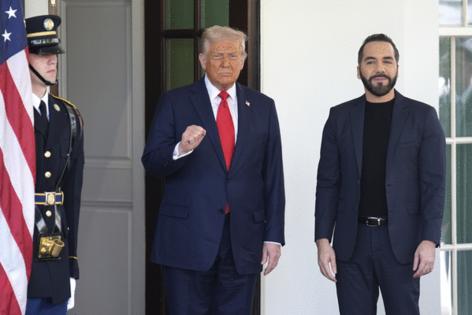Patricia Lopez: US citizens could be on a plane to El Salvador next
Published in Op Eds
The White House made it clear during a visit from Nayib Bukele, the president of El Salvador, that it plans to let Kilmar Abrego Garcia rot in the brutal prison to which — as the administration has admitted in court — he was deported by mistake.
The spectacle in the Oval Office on Monday was chilling. President Donald Trump warmly greeted Bukele and called him a “great friend.” Bukele, who brands himself as the “coolest dictator” in the world, won smiles from Trump as the two men agreed that they each were somehow powerless to act on Abrego Garcia’s behalf. Bukele contended that doing so would amount to “smuggling.” Stephen Miller, Trump’s deputy chief of staff, said even asking for Abrego Garcia’s return would amount to an “unimaginable invasion of El Salvador’s sovereignty.”
Nevertheless, a unanimous U.S. Supreme Court recently held that the administration should “facilitate” Abrego Garcia’s release from custody. Bukele’s visit showed the Trump administration edging closer to open defiance of that holding, bringing the U.S. that much closer to a constitutional crisis.
Pam Bondi, the U.S. Attorney General, said during the visit that two courts had ruled Abrego Garcia was a member of the notorious MS-13 gang and “was illegally in our country.” Neither statement is true. In fact, a district judge specifically found that the federal government had failed to produce sufficient evidence of gang membership, and a judge in 2019 had issued a withholding order that specifically protected him from deportation to El Salvador, his country of origin, for fear of reprisals.
Bondi’s disregard for the truth has become a hallmark of this administration. The DOJ lawyer who acknowledged that Abrego Garcia was deported in error has been placed on administrative leave.
Eric Janus, a constitutional expert and former president of William Mitchell College of Law in St. Paul, Minnesota, said that “this case has become the poster child for why we need due process.”
Janus said he has watched with increasing trepidation the administration’s stonewalling of the courts at every turn. Dragging its feet on court-ordered updates and splitting hairs over the meaning of “facilitate,” are ways of resisting courts’ ability to hold the White House accountable, he said. That, Janus told me, “is a proposition that gets us very close to a constitutional crisis.”
Trump selected Bukele to be the first Latin American leader received at the White House in his second term. Many of the nation’s longest standing allies have yet to visit, but Bukele got the full treatment on Monday, including a White House lunch and a lengthy Oval Office visit crammed with cabinet members and top aides, all serving to highlight his newly elevated status.
Bukele rose to power by promising to crack down on the gangs that had taken over parts of the country. His tactics were ruthless. After his election in 2019, he declared a national emergency on crime. In 2022, he imposed martial law and imprisoned 50,000 Salvadorans that year alone. He opened CECOT, a maximum security prison built to hold up to 40,000 gang members. It offers no visits, no recreation, no time outdoors and no programs for transitioning back to society.
At the White House, Bukele told Trump that although some complained that “we imprisoned thousands, I say we liberated millions.” A delighted Trump laughed and said to the room, “Who gave him that line? You think I could use that?”
Trump said Monday he was open to deporting U.S. citizens convicted of violent crimes to foreign prisons. The Justice Department, he said, was already studying the possibilities. “I’d like to include them in the group of people, to get them out of the country,” Trump said.
Later in the visit he referred to them by an unusual euphemism, calling them “the home-growns.” Talking to Bukele, Trump said, “The home-growns are next. You’ve got to build about five more places, it’s not big enough.”
There should be little doubt that the president who ran on mass deportations could easily embrace mass incarcerations, preferably at cheap foreign prisons. It’s not clear whether those citizens would ever return, given the administration’s argument that they are powerless to bring prisoners back once they are in the other country’s “sovereign” territory.
Trump’s administration is attempting to define this case as one in which the courts are overstepping their authority and attempting to instruct a president on foreign policy. That, too, is simply untrue. The Supreme Court — a third of which was appointed by Trump — showed deference to the executive branch on that very point.
The solution here is obvious: for the administration to acknowledge that mistakes happen but can be corrected; to bring Abrego Garcia back to the U.S.; and to make its case in court, at a proper deportation hearing. The rule of law demands no less.
_____
This column reflects the personal views of the author and does not necessarily reflect the opinion of the editorial board or Bloomberg LP and its owners.
Patricia Lopez is a Bloomberg Opinion columnist covering politics and policy. She is a former member of the editorial board at the Minneapolis Star Tribune, where she also worked as a senior political editor and reporter.
_____
©2025 Bloomberg L.P. Visit bloomberg.com/opinion. Distributed by Tribune Content Agency, LLC.




























































Comments